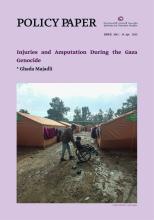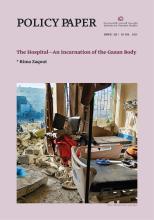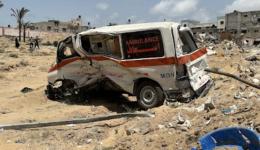Bombing of his home and his martyrdom alongside members of his family
Dr. Khalil al-Nakhal was martyred alongside his son Ahmad and his son-in-law Dr. Hammam Alloh as a result of an airstrike to his home.
The platform "Documenting the Targeting and Destruction of the Health Sector in the Gaza Strip" presents accurate and detailed information about the Israeli assault on health during the genocidal war. This includes data on the attacks on healthcare facilities and health workers who have been killed, abducted, tortured, and maimed by Israeli forces during the genocide, and relevant statements by international organizations and healthcare institutions. These are complemented by original analysis by researchers and authors covering a range of issues in the targeting of the health sector, through which Israeli occupation forces have created a "war biosphere". Read more
Dr. Khalil al-Nakhal was martyred alongside his son Ahmad and his son-in-law Dr. Hammam Alloh as a result of an airstrike to his home.
Dr. Mohammed Anis Makki was martyred alongside his wife Ayda Shukri Shbeir, his son Dr. Anis Makki, and his daughter Dr. Amal Mohammed Makki as a result of a strike on their home in Omar al-Mukhtar Street in Gaza.
Occupation forces bombed her home as she returned home. She was transferred to the Indonesian hospital for treatment and was martyre there. She was martyred alongside 18 members of her family.
On 4 November, Omar and his wife sustained severe injuries as a result of a strike on a neighboring house. He was treated in intensive care until he was martyred on 10 November 2023.
Dr. Bilal al-Farra was martyred as a result of a strike on a house in Qarara neighborhood in Western Khan Yunis. He was missing for a few days before his scattered remains were found.
He was martyred alongside his brother Dr. Abdallah, his father-in-law and two of his relatives as a result of a strike on the car they were in.
He was martyred alongside his father, Mohammed Abu al-Foul and his son, Sa'eed Ra'fat Abu al-Foul.
On the night of 26 May, after Israeli airstrikes hit a camp sheltering displaced people in a designated safe zone by Israel, 180 wounded people and 28 dead were recorded at the Trauma Stabilisation Point we support in Tal al Sultan, Gaza.
Most of the patients we treated had shrapnel wounds, fractures, traumatic injuries and burns.




